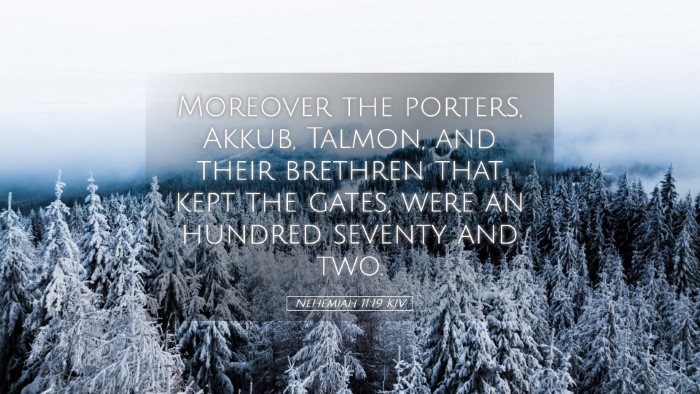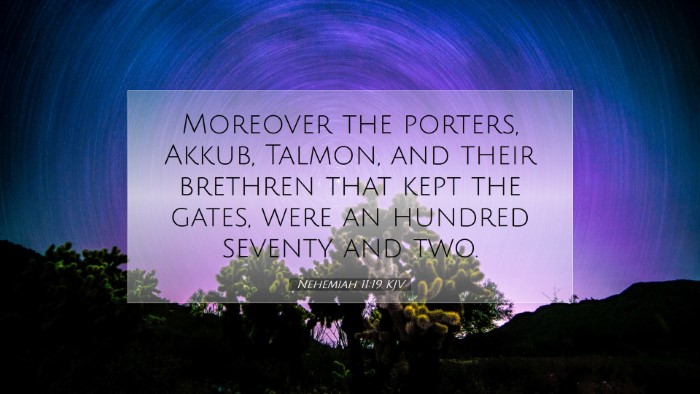Commentary on Nehemiah 11:19
Nehemiah 11:19: "And the porters, Akkub, Talmon, and their brethren, that kept the gates, were a hundred seventy and two." (KJV)
Introduction
This verse, though brief, serves a significant role in the context of the post-exilic community in Jerusalem. It reflects not only the organization of the city and its governance but also highlights the importance of certain roles within the community, particularly the porters or gatekeepers.
The Role of Porters
Historical Context: In the ancient Israelite society, the porters had a critical provision of securing the gates and ensuring all who entered and exited the city were known and authenticated. Matthew Henry notes that these men were tasked with guarding the entrances to the temple grounds and the city, a role that underscored their importance in maintaining order and security.
Spiritual Significance: The function of the porters is emblematic of the spiritual vigilance required of God's people. Adam Clarke emphasizes that just as physical gatekeepers protected the city from external threats, spiritual gatekeepers are essential in maintaining the integrity of the faith community against sin and false teachings.
Understanding the Numbers
Nehemiah records a specific number: one hundred seventy-two porters. Albert Barnes comments that the precision in numbers adds credibility to the historical account, indicating a well-organized system in post-exilic Jerusalem. Each porter had a role, emphasizing the theme of order and responsibility within the community.
- Order in Worship: The porters played a crucial role in ensuring that worship was not only organized but also sacred, protecting the spaces where the people could meet God.
- The Significance of Numbers: The exact count of porters hints at the importance of having adequate personnel for the spiritual and physical security of the community.
Leadership and Service
The identification of specific individuals—Akkub and Talmon—suggests a commendation of leadership within the ranks of the porters. Their mention signifies recognition and accountability. Matthew Henry notes that leaders are called to exemplify faithfulness in even the most humble tasks.
Implications for Today's Church: Modern pastors and church leaders should reflect on the importance of those who serve in roles that may seem menial yet are foundational to the vibrancy of church life.
Community and Inclusion
In this verse, the mention of the porters collectively implies a sense of community. Albert Barnes asserts that their unity and collaborative effort illustrate the necessary collaboration among the members of God's people.
- Encouragement for Teamwork: This presents encouragement for contemporary churches to appreciate and work together with various ministries, recognizing that each role contributes to the larger mission of the church.
- Inclusivity in Service: The verse invites reflection on how roles within the church can often lead to elevation or exclusion. The porters, while often overlooked, were crucial to the functioning of society and the worship of God.
Thematic Reflections
Security in Faith: The very essence of guardianship reflects a broader theme of vigilance in spiritual matters. Just as the porters served to guard physical gates, the church today needs individuals to safeguard beliefs and practices, ensuring fidelity to God's word.
Service as Worship: The porters' service was not merely functional but also an act of worship. This reinforces that all work done in the ecclesial community—large or small—is an offering to God.
Conclusion
Nehemiah 11:19 may be a small verse, but its implications are profound. It speaks volumes about leadership, community, service, and the spiritual vigilance required in maintaining a faithful witness for God. For pastors, students, and theologians, this verse serves as a reminder of the essential roles within the body of Christ and the enduring significance of order, security, and accountability in worship and community life.


